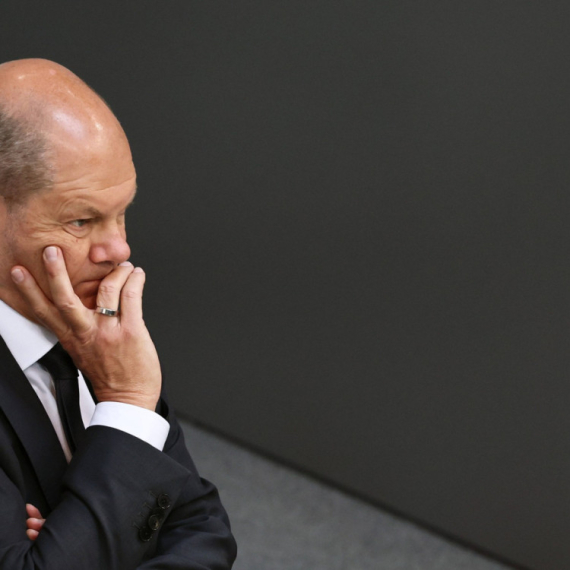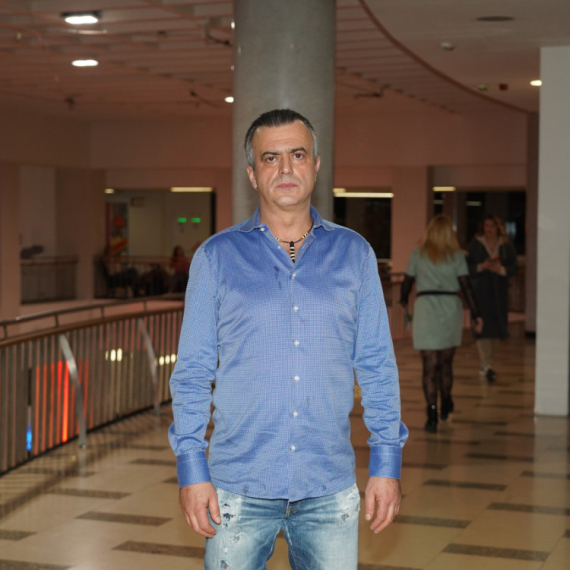Serbia going to ICJ is mistake
Tuesday, 16.09.2008.
12:53

Serbia going to ICJ is mistake In Central and Eastern Europe, the choice of the people and the politicians was clear - to re-claim their European past and bring it into the future, by seeking integration into the EU and NATO, to take their place as equals alongside those whose equals they had been before the Second World War had divided them. For many people, particularly the older ones, it was a very hard time. The politics weren't easy either. And none of this is yet 'finished' - reform is a long and hard process. At each stage, the organisations concerned, and their member states, were on hand with support and advice. Sometimes the advice wasn't welcome. Sometimes those giving it were not as sensitive as they could have been. But in the end an EU of 12 in 1990 became 27 in 2007; and a NATO of 16 became 26. At the same time neighbouring former Yugoslav countries - Slovenia, Macedonia, Croatia -were each set on developing their relationship with NATO and clearly coming to see that their future lay in that organisation. The absent partner in this process was Serbia. I won't go into the entire historical context, but the legacy of the conflicts still hangs over Serbia now, complicating its democratic political development and its integration prospects. Serbia's integration process has not only been painfully slow, at times it has gone into reverse. Just a year ago, former Prime Minister Kostunica's DSS, after a long campaign aimed at demonising NATO over Kosovo, managed to remove NATO membership for Serbia from the domestic political agenda. The consequences of this in few years' time would be to leave Serbia as the only country in south-east Europe outside the Alliance, isolated from the many benefits that membership offers. On the other hand, more recently, we have seen the positive 'pull' effect of integration too. Serbia's elections earlier this year became referenda. On one side was the pro-European vision of President Tadic and his allies. On the other were the Radicals, led remotely by a war crimes indictee on trial at The Hague who would have taken the whole region backwards, and a DSS fixated entirely on its sense of bitter grievance over Kosovo. In the end, while the campaign was close fought, the voters' choice was clear. We saw, and supported, a pro-European evolution on the part of the old Socialist party. Europe's message to them was clear - if your change is genuine, we will recognise that. And we did. And now we may be seeing a similar process start to affect even the Radical party. Some elements there have found their voice, and have made clear their dissatisfaction with the old Seselj line. Today, a new party may be emerging. We hope that those concerned now fully accept that Serbia's future lies in cooperating with its neighbours, as a stable democracy in Europe, and are prepared to work positively towards that goal. If so, I would expect that Europe's message to them will be the same as it was to the Socialists - if your change is genuine, if your commitment to modern European democratic values is real, we will recognise that, and we want to work with you. Parties and people can change. What matters are values and policies. We may still disagree on many things, but if the basic framework for mutual respect is in place, we can try to find ways to move forward together. And for those who remain fixated on the past, who cannot change, we remember Gorbachev's words to Erich Honecker in 1989 - 'Life punishes those who come too late'. But simply wanting to integrate - while important - does not make it happen. The final steps in this long and very mixed process of Serbia's cooperation with ICTY need to be completed as soon as possible. The other issue we need to resolve is the issue of Kosovo. As I have said before, the EU has not set as a condition that Serbia should recognise Kosovo before it can integrate. We realise in the UK that this is simply not possible for Serbia, and we recognise also that a small number of fellow EU member states have themselves not accepted Kosovo's independence. But we do all look to Serbia to work cooperatively with the EU over Kosovo, in particular over the EULEX mission, whose main role will particularly benefit minorities in Kosovo. Some time ago, the UK suggested that we should find a way to 'agree to disagree' over Kosovo's status, effectively to allow us to set the status issue to one side and focus instead on working together to make life better for all the people living in Kosovo. At the same time, we made clear our concerns over Serbia's intention to seek an Advisory Opinion on Kosovo's declaration of independence from the International Court of Justice, which we believed to be a mistake, which would only force us to continue to focus on what divides us, rather than on what we can do together. Unfortunately, Serbia has not yet responded positively to these approaches. Returning from leave recently, I saw the result of this in a series of reports of conversations between the United Kingdom and many of its partners, in which the focus has, unfortunately, once again been not on Serbia as a partner but on Serbia as a 'problem'. Indeed, it is not always easy to think of a country as a partner when its representatives, almost daily, publicly accuse us and most of the rest of the EU of violating international law. We need to find a better way forward. We strongly believe that Serbia has a bright future, as a member of the EU - and, one day we hope, of NATO too. This is, quite simply, because we believe that integration of the whole region - including Serbia and Kosovo - offers the best chance of lasting peace and growing prosperity for all its peoples. Stephen Wordsworth is the British ambassador to Serbia. This article originally appeared in Politika Ambassador Stephen Wordsworth (FoNet) As always in the Balkans, you have to start with the history. But don't worry - I am not going back to the fourteenth century, only to the 1990s. As the 1980s came to an end, the barriers came down across Europe. The Soviet Union had lost its grip on its neighbours. Finally it too dissolved. Ambassador Stephen Wordsworth "We made clear our concerns over Serbia's intention to seek an Advisory Opinion on Kosovo's declaration of independence from the International Court of Justice, which we believed to be a mistake, would only force us to continue to focus on what divides us, rather than on what we can do together."
Serbia going to ICJ is mistake
In Central and Eastern Europe, the choice of the people and the politicians was clear - to re-claim their European past and bring it into the future, by seeking integration into the EU and NATO, to take their place as equals alongside those whose equals they had been before the Second World War had divided them.For many people, particularly the older ones, it was a very hard time. The politics weren't easy either. And none of this is yet 'finished' - reform is a long and hard process.
At each stage, the organisations concerned, and their member states, were on hand with support and advice. Sometimes the advice wasn't welcome. Sometimes those giving it were not as sensitive as they could have been. But in the end an EU of 12 in 1990 became 27 in 2007; and a NATO of 16 became 26.
At the same time neighbouring former Yugoslav countries - Slovenia, Macedonia, Croatia -were each set on developing their relationship with NATO and clearly coming to see that their future lay in that organisation.
The absent partner in this process was Serbia. I won't go into the entire historical context, but the legacy of the conflicts still hangs over Serbia now, complicating its democratic political development and its integration prospects. Serbia's integration process has not only been painfully slow, at times it has gone into reverse. Just a year ago, former Prime Minister Koštunica's DSS, after a long campaign aimed at demonising NATO over Kosovo, managed to remove NATO membership for Serbia from the domestic political agenda. The consequences of this in few years' time would be to leave Serbia as the only country in south-east Europe outside the Alliance, isolated from the many benefits that membership offers.
On the other hand, more recently, we have seen the positive 'pull' effect of integration too. Serbia's elections earlier this year became referenda. On one side was the pro-European vision of President Tadić and his allies. On the other were the Radicals, led remotely by a war crimes indictee on trial at The Hague who would have taken the whole region backwards, and a DSS fixated entirely on its sense of bitter grievance over Kosovo. In the end, while the campaign was close fought, the voters' choice was clear.
We saw, and supported, a pro-European evolution on the part of the old Socialist party. Europe's message to them was clear - if your change is genuine, we will recognise that. And we did. And now we may be seeing a similar process start to affect even the Radical party. Some elements there have found their voice, and have made clear their dissatisfaction with the old Šešelj line.
Today, a new party may be emerging. We hope that those concerned now fully accept that Serbia's future lies in cooperating with its neighbours, as a stable democracy in Europe, and are prepared to work positively towards that goal. If so, I would expect that Europe's message to them will be the same as it was to the Socialists - if your change is genuine, if your commitment to modern European democratic values is real, we will recognise that, and we want to work with you. Parties and people can change. What matters are values and policies. We may still disagree on many things, but if the basic framework for mutual respect is in place, we can try to find ways to move forward together.
And for those who remain fixated on the past, who cannot change, we remember Gorbachev's words to Erich Honecker in 1989 - 'Life punishes those who come too late'.
But simply wanting to integrate - while important - does not make it happen. The final steps in this long and very mixed process of Serbia's cooperation with ICTY need to be completed as soon as possible.
The other issue we need to resolve is the issue of Kosovo.
As I have said before, the EU has not set as a condition that Serbia should recognise Kosovo before it can integrate. We realise in the UK that this is simply not possible for Serbia, and we recognise also that a small number of fellow EU member states have themselves not accepted Kosovo's independence. But we do all look to Serbia to work cooperatively with the EU over Kosovo, in particular over the EULEX mission, whose main role will particularly benefit minorities in Kosovo.
Some time ago, the UK suggested that we should find a way to 'agree to disagree' over Kosovo's status, effectively to allow us to set the status issue to one side and focus instead on working together to make life better for all the people living in Kosovo. At the same time, we made clear our concerns over Serbia's intention to seek an Advisory Opinion on Kosovo's declaration of independence from the International Court of Justice, which we believed to be a mistake, which would only force us to continue to focus on what divides us, rather than on what we can do together.
Unfortunately, Serbia has not yet responded positively to these approaches. Returning from leave recently, I saw the result of this in a series of reports of conversations between the United Kingdom and many of its partners, in which the focus has, unfortunately, once again been not on Serbia as a partner but on Serbia as a 'problem'. Indeed, it is not always easy to think of a country as a partner when its representatives, almost daily, publicly accuse us and most of the rest of the EU of violating international law.
We need to find a better way forward. We strongly believe that Serbia has a bright future, as a member of the EU - and, one day we hope, of NATO too. This is, quite simply, because we believe that integration of the whole region - including Serbia and Kosovo - offers the best chance of lasting peace and growing prosperity for all its peoples.
Stephen Wordsworth is the British ambassador to Serbia. This article originally appeared in Politika





























Komentari 38
Pogledaj komentare